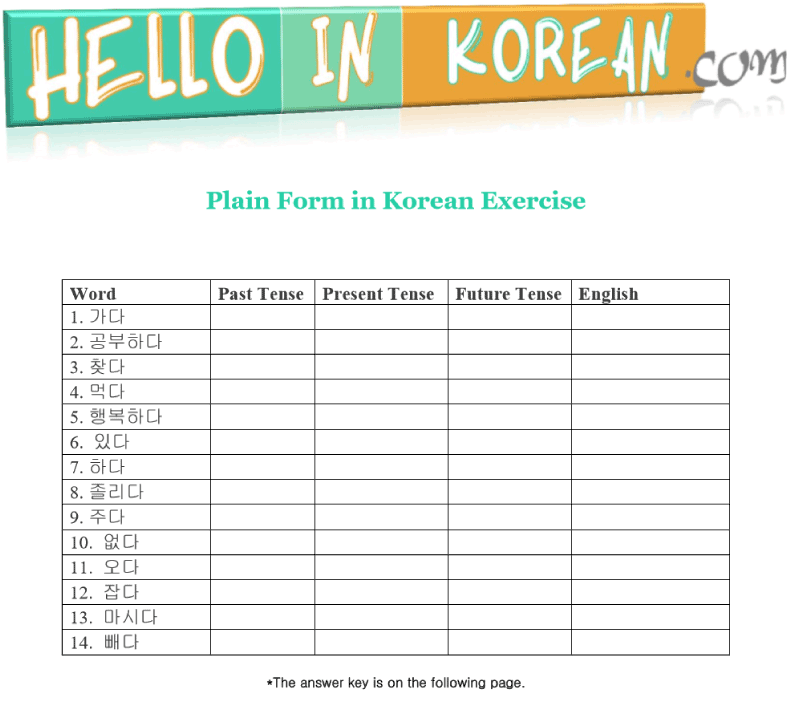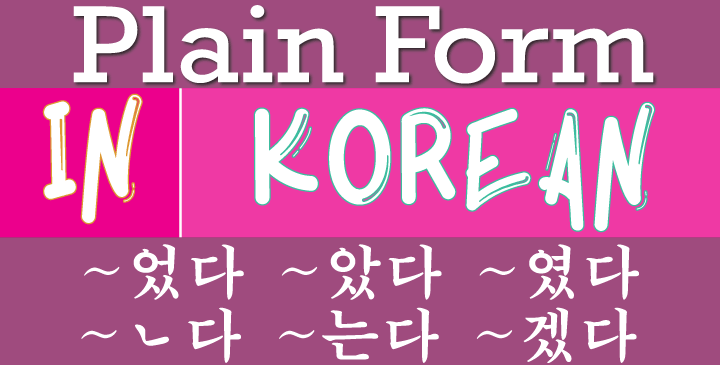Plain Form in Korean
Plain Form Usages
1. You can find the plain form in Korean in newspapers, books, magazines, and most written materials. The plain form does not use Korean honorifics, 존댓말 or 반말, as what is written usually isn’t directed at any specific person.
2. The plain form in Korean can be used in speech but not to someone older than you. It is usually used to announce something or as a reaction.
Ex. 좋다! = It’s good!
있다! = It’s here!
Present Tense Plain Form
For Action Verbs
1. If the last letter in a verb stem is a vowel add ~ㄴ다.
가다 = go
가 + ㄴ다 = 간다
나는 집에 간다. = I go home.
오다 = come
오 + ㄴ다 = 온다
나는 학교에 온다. = I come to school.
공부하다 = study
공부하 + ㄴ다 = 공부한다
나는 한국어를 공부한다. = I study Korean.
2. If the last letter in a verb stem is a consonant add ~는다.
찾다 = find, look for
찾 + 는다 = 찾는다
나는 열쇠를 찾는다. = I look for the keys.
먹다 = eat
먹 + 는다 = 먹는다
나는 김치를 먹는다. = I eat kimchi.
잡다 = hold, catch
잡 + 는다 = 잡는다
나는 공을 잡는다. = I catch the ball.
For Descriptive Verbs
The plain form for descriptive verbs is the same as their dictionary form.
행복하다 = happy
나는 아주 행복하다 = I am very happy.
졸리다 = sleepy
나는 졸리다 = I am sleepy.
[mailmunch-form id=”336149″]
Past Tense Plain Form
1. If the last vowel in a verb stem is ㅏ or ㅗ add ~았다.
찾다 = find, look for
찾 = 찾 + 았다 = 찾았다
If a verb stem ends in a vowel then ~았다 is combined with it.
가다 = go
가 + 았다 = 갔다
오다 = come
오 + 았다 = 왔다
2. If the last vowel in a verb stem is not ㅏ or ㅗ add ~었다.
먹다 = eat
먹 + 었다 = 먹었다
If a verb stem ends in a vowel then ~었다 is combined with it.
주다 = give
주 + 었다 = 줬다
마시다 = drink
마시 + 었다 = 마셨다
켜다 = turn on
켜 + 었다 = 켰다
빼다 = remove, subtract
빼 + 었다 = 뺐다
나서다 = leave, meddle in
나서 + 었다 = 나섰다
3. If the verb ends in 하다 add ~였다.
하다 = do
하 + 였다 = 했다
공부하다 = study
공부하 + 였다 = 공부했다
사랑하다 = love
사랑하 + 였다 = 사랑했다
Future Tense Plain Form
Add ~겠다 to the verb stem.
찾다 = find, look for
찾 = 찾 + 겠다 = 찾겠다
가다 = go
가 + 겠다 = 가겠다
마시다 = drink
마시 + 겠다 = 마시겠다
빼다 = remove, subtract
빼 + 겠다 = 빼겠다
하다 = do
하 + 겠다 = 하겠다
공부하다 = study
공부하 + 겠다 = 공부하겠다
Learn Korean Language Tips
있다 and 없다 can be either action verbs or descriptive verbs depending on how they are used.
있다 and 없다 are conjugated as descriptive verbs in the plain form.
있다 in the Plain Form
| Past Tense | Present Tense | Future Tense |
| 있었다 | 있다 | 있겠다 |
없다다 in the Plain Form
| Past Tense | Present Tense | Future Tense |
| 없었다 | 없다 | 없겠다 |
Plain Form in Korean Review Table
| Korean | Past Tense | Present Tense | Future Tense | English |
| 가다 | 갔다 | 간다 | 가겠다 | go |
| 하다 | 했다 | 한다 | 하겠다 | do |
| 있다 | 있었다 | 있다 | 있겠다 | have, exist |
| 찾다 | 찾았다 | 찾는다 | 찾겠다 | find, look for |
| 먹다 | 먹었다 | 먹는다 | 먹겠다 | eat |
| 없다 | 없었다 | 없다 | 없겠다 | not have, not exist |
| 공부하다 | 공부했다 | 공부한다 | 공부하겠다 | study |
Plain Form in Korean Exercise

Fill out the form below to get the exercise and answer key PDF.
[mailmunch-form id=”336149″]

Leave a Reply
You must be logged in to post a comment.